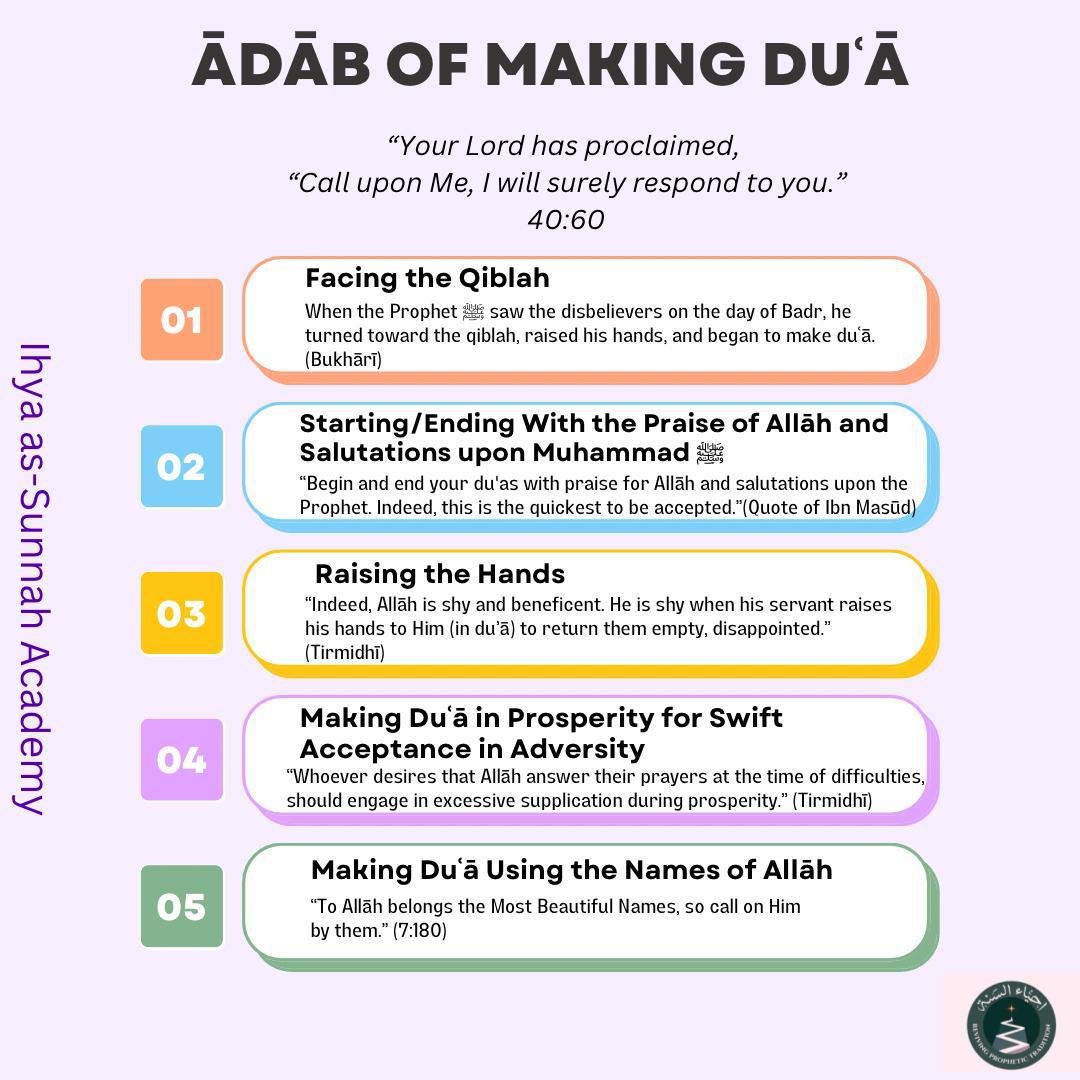The Power of Du‘ā: The Essence of Worship
Allah’s Command to Call Upon Him
Du‘ā (supplication) is one of the greatest acts of worship, emphasized throughout the Qur’ān and Sunnah. Allah commands His servants to call upon Him:
وَقَالَ رَبُّكُمُ ٱدْعُونِىٓ أَسْتَجِبْ لَكُمْ ۚ إِنَّ ٱلَّذِينَ يَسْتَكْبِرُونَ عَنْ عِبَادَتِى سَيَدْخُلُونَ جَهَنَّمَ دَاخِرِينَ
“And your Lord says: Call upon Me; I will respond to you. Verily, those who scorn My worship will surely enter Hell in humiliation.” (Surah Ghāfir 40:60)
This verse highlights the importance and virtue of du‘ā—it is not only a means of seeking Allah’s help but an act of ‘ibādah (worship) itself.
The Virtues of Du‘ā
1. Du‘ā is ‘Ibādah Itself
The Prophet ﷺ said:
الدُّعَاءُ هُوَ العِبَادَةُ
“Du‘ā is the essence of worship.” (Tirmidhī 3372)
This is because true worship stems from complete reliance on Allah. When a person makes du‘ā, they affirm their belief that only Allah can help them. This is the essence of Tawḥīd—recognizing Allah as the sole provider, helper, and controller of all affairs.
2. Allah is Close and Ever-Listening
Allah assures us of His nearness and readiness to respond:
وَإِذَا سَأَلَكَ عِبَادِى عَنِّى فَإِنِّى قَرِيبٌ ۖ أُجِيبُ دَعْوَةَ ٱلدَّاعِ إِذَا دَعَانِ
“And when My servants ask you concerning Me, indeed I am near. I respond to the invocation of the supplicant when he calls upon Me.” (Surah al-Baqarah 2:186)
It is important to note that when we say Allah is close, we do not mean that He is confined to a place or direction. Allah is beyond time and space, as He is the Creator of both. Rather, this verse highlights how quick Allah is in responding to the du‘ās of His slaves and the vastness of His mercy. His nearness refers to His knowledge, aid, and responsiveness to those who sincerely call upon Him.
3. Du‘ā Protects from Envy and Hasad (Jealousy)
Rather than envying what others have, Allah commands us to turn to Him in du‘ā:
وَلَا تَتَمَنَّوْا۟ مَا فَضَّلَ ٱللَّهُ بِهِۦ بَعْضَكُمْ عَلَىٰ بَعْضٍ
“Do not wish for what Allah has favored some of you over others…” (Surah an-Nisā 4:32)
Instead of desiring what others possess, we are taught to ask Allah directly for what we need. Du‘ā shifts our focus from resentment to reliance on Allah’s mercy.
4. Du‘ā is the Key to Divine Mercy
The Prophet ﷺ said:
مَنْ فُتِحَ لَهُ مِنْكُمْ بَابُ الدُّعَاءِ فُتِحَتْ لَهُ أَبْوَابُ الرَّحْمَةِ
“Whoever from among you the doors of du‘ā are opened for, then the doors of Rahmah (mercy) are also open for him.” (Tirmidhī 3548)
Thus, the ability to turn to Allah in supplication is itself a sign of His mercy upon a person.
5. Anticipating Relief is the Best Act of Worship
Ibn Mas‘ūd رضي الله عنه narrated that the Prophet ﷺ said:
سَلُوا اللَّهَ مِنْ فَضْلِهِ فَإِنَّ اللَّهَ يُحِبُّ أَنْ يُسْأَلَ وَإِنَّ أَفْضَلَ الْعِبَادَةِ انْتِظَارُ الْفَرَجِ
“Ask Allah from His mercy, for indeed Allah loves to be asked, and the best act of worship is anticipating the relief.” (Tirmidhī 3571)
The Etiquettes of Du‘ā: How to Ensure Our Supplications Are Accepted
To maximize the acceptance of our du‘ās, the Sunnah teaches us several etiquettes:
1. Facing the Qiblah
During the Battle of Badr, when the Prophet ﷺ saw the enemy, he turned towards the Qiblah and made an intense du‘ā, seeking Allah’s help. (Bukhārī, Muslim)
2. Starting and Ending with Praise of Allah and Ṣalawāt upon the Prophet ﷺ
A companion once made du‘ā without beginning with praise of Allah. The Prophet ﷺ advised him:
“When one of you prays, let him start by praising Allah and glorifying Him, then send Ṣalāh upon the Prophet ﷺ, and then make du‘ā for whatever he wishes.” (Abū Dāwūd, Tirmidhī)
3. Raising the Hands
The Prophet ﷺ said:
“Indeed, Allah is Shy and Generous. He is shy that when His servant raises his hands to Him (in du‘ā), He would return them empty and disappointed.” (Tirmidhī)
This hadith encourages believers to raise their hands in humility, as it is a sign of complete dependence on Allah.
4. Making Du‘ā in Times of Ease
The Prophet ﷺ emphasized that if we want our du‘ās to be accepted during hardships, we should frequently make du‘ā during times of ease.
He said:
“Whoever wishes that Allah responds to his du‘ā in hardships and difficulties, let him increase his du‘ā in times of ease.” (Tirmidhī)
5. Calling Upon Allah Using His Beautiful Names
Allah says:
“And to Allah belong the Most Beautiful Names, so invoke Him by them.” (Surah al-A‘rāf 7:180)
Using specific names of Allah that relate to our requests adds depth and sincerity to our supplications. For example:
- Seeking forgiveness → Yā Ghaffār, Yā Raḥīm (O Most Forgiving, O Most Merciful)
- Seeking provision → Yā Razzaq (O Provider)
- Seeking guidance → Yā Hādī (O Guide)
6. Being Firm and Certain in Du‘ā
A believer should never doubt whether their du‘ā will be accepted. Instead, they should be firm and determined in their asking.
The Prophet ﷺ said:
“When one of you makes du‘ā, then he should not say, ‘O Allah, forgive me if You will,’ or ‘Have mercy on me if You will.’ Rather, he should be firm and determined in his asking, for verily Allah does as He Wills, and there is no force upon Him.” (Bukhārī)
This hadith teaches us to have conviction in our du‘ās. We should not place conditions on Allah’s mercy but should ask with full confidence in His generosity.
The Habit of Du‘ā: A Means to Earn the Du‘ā of Angels
One of the most important aspects of du‘ā is making it a daily habit. Salman al-Fārsī رضي الله عنه narrated:
إِذَا رَفَعَ العَبْدُ يَدَيْهِ إِلَى اللَّهِ وَهُوَ دَائِمُ الدُّعَاءِ، فَتَعْرِفُهُ المَلَائِكَةُ فِي السَّمَاءِ وَتَسْتَغْفِرُ لَهُ، وَإِذَا لَمْ يَكُنْ مِنْ أَهْلِ الدُّعَاءِ، فَإِذَا رَفَعَ يَدَيْهِ، قَالَتِ المَلَائِكَةُ: مَنْ هَذَا؟ إِنَّا لَا نَعْرِفُ صَوْتَهُ
“When a slave raises his hands and makes du‘ā, if he has a habit of doing so, the angels in the sky recognize his voice and also engage in making du‘ā on his behalf. However, if a slave does not have the habit of making du‘ā, when he raises his hands to Allah, the angels in the sky become confused and ask among themselves, ‘Whose voice is this? We do not recognize this voice.’ Thus, he deprives himself of the du‘ās of the angels as well.”
This narration highlights a profound reality: for any ‘ibādah (act of worship) to be truly impactful, it must first become an ‘ādah (habit). The more consistently we turn to Allah, the more our supplications become known to the angels, who in turn make du‘ā for us.
Conclusion: The Power of Du‘ā in Our Lives
Du‘ā is not just a means to ask for worldly and spiritual needs; it is a direct connection between a servant and his Creator. It is an expression of humility, reliance, and devotion to Allah.
By understanding its virtues and following its etiquettes, we can make du‘ā a powerful and transformative force in our lives—one that strengthens our faith, protects us from harm, and draws us closer to Allah’s mercy.
Additionally, we should strive to make du‘ā a constant habit so that our voices become recognized by the angels and we never deprive ourselves of their supplications on our behalf.
Let us strive to increase our du‘ās and turn to Allah in all circumstances, for He is always near and responsive to those who call upon Him with sincerity.
“وَقَالَ رَبُّكُمُ ٱدْعُونِىٓ أَسْتَجِبْ لَكُمْ”
“And your Lord says: Call upon Me; I will respond to you.” (Surah Ghāfir 40:60)
References
- Ṣaḥīḥ al-Bukhārī
- Ṣaḥīḥ Muslim
- Al-Adhkār – Imām an-Nawawī
- Hujjatullāh al-Bālighah – Shāh Waliullāh ad-Dihlawī
- Al-Minhāj Sharḥ Ṣaḥīḥ Muslim – Imām an-Nawawī






